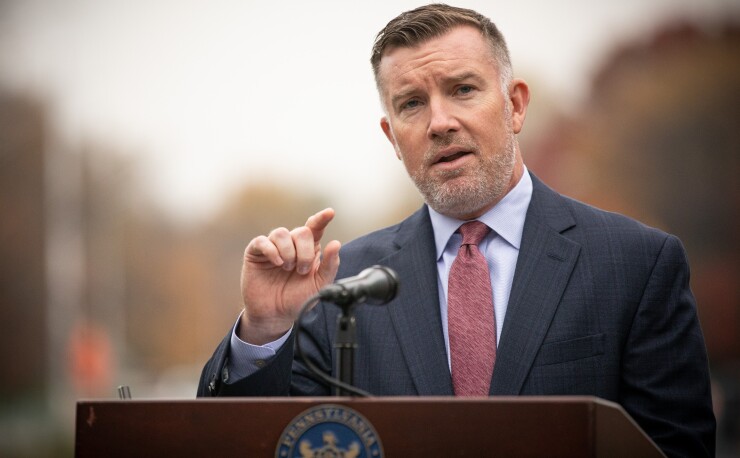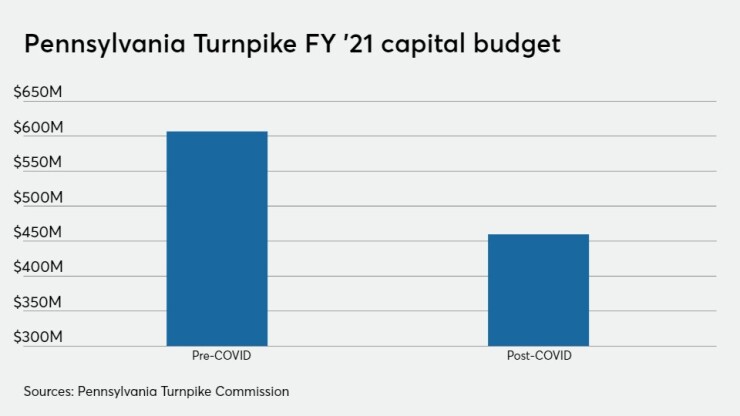The Pennsylvania Turnpike Commission plans to come back from the coronavirus without its toll-collection staff, a decision that brings political blowback and a potential lawsuit.
The commission was planning to complete the transition to all-electronic tolling in January 2022. When the pandemic escalated in March, cutting traffic and bringing safety concerns about customer and cash contact, it ceased cash collections in what it billed as a temporary move.

The commission announced the layoffs of 492 toll collectors on June 2 — two weeks after signing a contract with their union.
“There will be no return to cash collections,” PTC Chief Executive Mark Compton said.
The turnpike commission is saddled with debt from a misjudgment the commonwealth made years ago and COVID-19 has now pummeled its revenues.
Then PTC’s board made other austerity moves that included operating and capital spending cuts, and a delay in its transit-funding quarterly payment of $112.5 million to the state, due in July.
PTC, according to Compton, has estimated a $100 million toll-revenue hit from the pandemic-related lockdown. Cumulative traffic is down about 46%. Its pre-coronavirus revenue forecast for fiscal 2020 was $1.4 billion.
“The only other event that has similarly affected the turnpike’s traffic and revenue was World War II,” Compton said Monday at a joint hearing of the state Senate committees of transportation, and labor and industry.
Labor leaders say the PTC and the state welched on a collective-bargaining agreement ratified May 19, and that officials were using COVID-19 health concerns as an excuse to quickly convert to cashless.
“This was nothing more than a premeditated hit,” said William Hamilton, Teamsters International vice president-east. “An unfair labor practice complaint will be filed,” he said.
“We will use all the assets that we have to fight this,” Hamilton said. “I think the most disturbing thing is the way it happened, by not telling a soul, even in the House and the Senate, that they were doing this. This sends a bad message to anybody dealing with the state in the future, that they don’t live up to their word.”
State Sen. Christine Tartaglione, D-Philadelphia, the Democratic chairwoman of the labor and industry panel, suggested Pennsylvania’s inspector general investigate.
“I think you guys were woefully unprepared,” she told Compton and other PTC officials at the contentious hearing that lasted nearly three hours. “There are numbers and facts and dates that you have not been able to give us. I think this was done in secret.
“I am convinced that an investigation is needed into the decision-making process described ambiguously by PTC officials,” Tartaglione said after the hearing.
A group of 17 senators has written Gov. Tom Wolf asking him to suspend the layoffs. Congressmen Brian Fitzpatrick, a Republican, and Brendan Boyle, a Democrat, have similarly written Wolf and Compton.
According to Hamilton, Wolf had previously promised the toll collector jobs would last until January 2022.
Hamilton said that when he spoke with Wolf the day the layoffs were announced, the governor said: “OK, I’m guilty.”
Wolf,
The Office of Administration is assisting with alternative employment options, Wolf said. “As the commonwealth continues to respond to the pandemic, new employment opportunities will arise as well.”
Wolf, a Democrat working with a Republican-controlled legislature in what pundits nationally call a battleground state, has been under fire for his handling of the pandemic. State Rep. Daryl Metcalfe, R- Cranberry Township, said Tuesday that he and 24 co-sponsors have introduced a resolution calling for Wolf’s impeachment.
Metcalfe in a statement accused the governor of “unconstitutional dictates and Orwellian overreach.” Wolf has countered by citing recognition from the Centers for Disease Control and Prevention as one of three states, along with Montana and Hawaii, with a downward trajectory of COVID-19 cases for more than 42 days.
The governor declared a state of emergency on March 16, closing all non-essential businesses statewide. Pennsylvania has been reopening regions in phases coded red, yellow and green, after traffic lights.
Officials first explored cashless options for the Turnpike in a 2011 feasibility study.
In 2013, conversion planning, design and employee engagement began in earnest. It launched pilot projects for testing and evaluation at the Delaware River Bridge in 2016; at the Beaver Valley Expressway in 2017; at two toll plazas on the upper Northeastern Extension and the Southern Beltway in 2018; and at the Greensburg Bypass and Gateway Toll Plaza in 2019.
Coronavirus, meanwhile, has prompted several states to consider or advance its plans for cashless tolling, which is already widely in effect on toll roads across the country.
The Bay Area Toll Authority suspended cash toll collections on its seven San Francisco-area bridges in March, and officials
The
Tolls will rise 36% on the New Jersey Turnpike and 27% on the Garden State Parkway to help finance $24 billion in construction projects over 20 years.
Travel on roads and streets nationwide was down 18.6% in March year over year, and down 39.8% in April year over year, according to
"May and June will not going to be as bad as April, but they will be negative year over year," said Tom Kozlik, head of municipal strategy and credit for Hilltop Securities.
"I would expect that travel activity levels will improve as economic activity comes back, but it is still very possible if not likely that cumulative travel volume is down for the year. A scenario with down cumulative travel for the year could pose a challenge for budgets."
The pandemic could create innovative funding opportunities, according to municipal bond analyst Joseph Krist.
“One of those sectors in the middle of technological change and its impact is transportation," he said. "Some states may find that the need to strengthen state finances in the aftermath of the pandemic allows for more creative thought.”
Krist cited the transportation department’s suggestion in fossil-fuel state Wyoming that “a per-mile road usage charge was an option worth considering” to help fund state road projects. Utah and Oregon recently implemented optional per-mile fees.
Another alternative Wyoming weighed was a bill to create a master Interstate 80 tolling plan, with possible exemptions for Wyoming drivers. It failed introduction in the Senate, with nearly two-thirds of legislators opposed.
In Pennsylvania, the turnpike commission slashed its 10-year, $5.95 billion capital spending by 25% to focus on core functions. As a result, Compton said the commission pared its FY21 capital budget to $459.7 billion from $606.7 billion.
It also reduced operating expenses by $30 million, primarily through a hiring freeze and a voluntary-retirement program of which 30 employees have taken advantage. The commonwealth agreed to let PTC delay the $112.5 million payment under Act 44.
The act, adopted under Gov. Ed Rendell in 2007, among other measures sought federal approval to convert I-80 into a toll road. East-west I-80, parallel to the Turnpike, spans northern Pennsylvania.
But contrary to expectations in Pennsylvania, the Federal Highway Administration rejected the tolling proposal. The Turnpike Commission still had to make annual payments of $450 million to the Pennsylvania Department of Transportation. A 2013 law revised the funding obligation and required PTC to pay PennDOT $450 million annually through fiscal 2022.

Fitch Ratings on April 2 lowered its outlook on the PTC’s subordinate-lien bonds, which it rates A-minus, to negative from stable, citing the decline in traffic and revenue from COVID-19. Fitch then restored the stable outlook on June 12, citing a range of mitigation efforts that included the cash defeasance of about $155 million of debt in fiscal 2021.
Fitch rates the senior bonds A-plus.
“They really noted what we’ve done on the mitigation strategies,” Compton said. “It’s the multipronged, phased approach that we’ve done. This wasn’t just about fare collection. There have been a multitude of things the commission has done to try to maintain those ratings, which are vital because we are $14 billion in debt with $800 million a year in debt service.”
Separately, PTC has secured a roughly $200 million line of credit from TD Bank to fund operating expenses, if needed. “At this time, the hope is that we will not need to draw on the liquidity facility,” Compton told the senators.
Kroll Bond Rating Agency assigned long-term and short-term letter of credit backed ratings of AA-/K1-plus. Moody’s assigned an Aa1/VMIG 1 rating.
Lawmakers sparred with Compton and other PTC officials for nearly three hours over what and when the commission knew about the layoffs before acting.
“I can’t understand how in two weeks this all changed,” Tartaglione said. “I can’t understand how you would ratify a contract with concessions on severance, have them ratify it, and then two weeks later decide it’s not going to work. If you were doing your homework and your due diligence you would know within two weeks.”
“We ratified it because we shook hands in February. Teamsters voted it in,” Compton said.
Tartaglione replied: “So you’re telling me your handshake is not good.”





